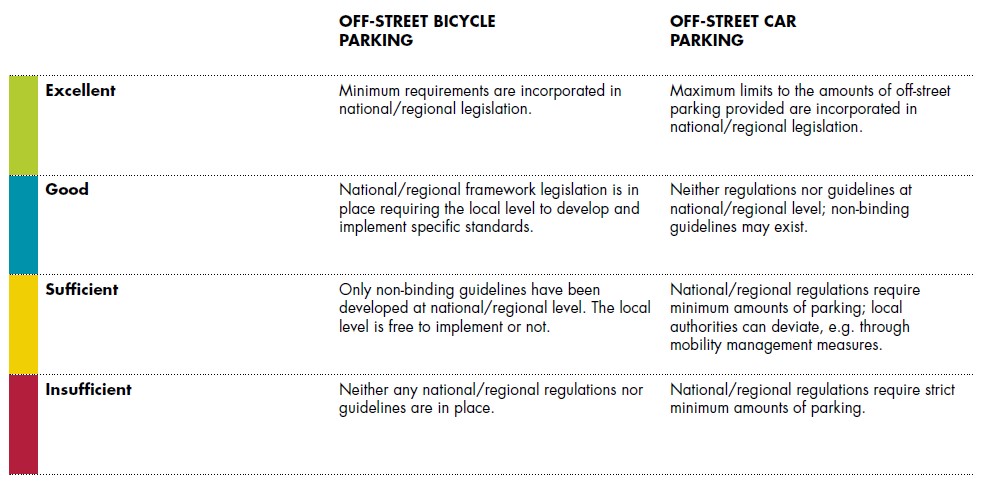
ECF ranks France on top with most sustainable parking policy in Europe
"France has the best off-street parking regulations in place when it comes to promoting sustainable mobility in Europe" found a report published by the European Cyclists’ Federation.
Link to the 'Making Buildings fit for Sustainable Mobility' Report Link to the Executive Summary
France belongs to a select club of six countries (Bulgaria, Cyprus, France, Hungary, Lithuania and Slovenia) that have set minimum requirements for bicycle parking at national level, and is also the only country that has introduced maximum norms for car parking as well. Maximum norms prevent building developers from providing more car parking spots per housing unit than the national law prescribes. In France, this equates to 1 car parking spot per housing unit (typically an apartment) with the norm being reduced to 0.5 when the building is located within 500 meters of public transport. Crucially, this law only applies to developments that are co-financed using State funds.
Runners-up at the national ranking were Hungary, Lithuania, the Netherlands and Slovenia. At the regional level, Berlin, Hamburg and Tyrol were identified as having the most sustainable parking regulations.
The ECF ‘Making Buildings fit for Sustainable Mobility’ Report (Parking Report) looked at a total of 56 off-street parking regulations for both bicycles and cars in a total of 31 European countries, thereof 28 national regulations and 28 regional regulations in Austria, Belgium, and Germany.
The Parking Report is the first of its kind to systematically collect, compare and rank parking codes across Europe. In order to rank regions and countries, a cluster system of four categories (excellent - good – sufficient – insufficient) were developed for bicycle and car parking.
 Fabian Küster, ECF Senior Policy Officer and lead author of the Parking Report, stated: “We need to have a debate on how buildings can become more sustainable. More sustainable in terms of mobility, energy-efficiency and affordability. Installing minimum bicycle norms while getting rid of minimum car parking norms and regulating maximum limits is an essential tool on delivering on all three objectives.”
Fabian Küster, ECF Senior Policy Officer and lead author of the Parking Report, stated: “We need to have a debate on how buildings can become more sustainable. More sustainable in terms of mobility, energy-efficiency and affordability. Installing minimum bicycle norms while getting rid of minimum car parking norms and regulating maximum limits is an essential tool on delivering on all three objectives.”
Prof. Dirk Lauwers (University of Antwerp), who framed the discussion at the launch event of the Parking Report, reminded participants that on-street car parking in Brussels was forbidden just 100 years ago. It was only when Ministers began parking their cars outside government buildings for meetings that the practice of on-street parking started.
It is clear that parking provisions lead to higher car ownership, and higher car ownership leads to higher usage. We need to break that cycle."
- Prof. Dirk Lauwers (University of Antwerp)
The Parking Report launch event also highlighted good practice examples around Europe as presented by Kirsten Pfaue, Cycle Coordinator of the City of Hamburg; Oliver Schneider, President of the Federation of French Cyclists (FUB); and Jorrit Nijhuis, Senior Policy Adviser Senior Policy Adviser, Dutch Ministry of Infrastructure and Water Management. Patrick Auwerx, from Mobiel 21 and Coordinator of the Horizon 2020 Park4SUMP project, introduced the development of the PARKPAD Tool (inspired by the BYPAD modal) bringing political decision makers and civil service staff around the table to discuss and agree on a joint plan to address the challenges linked to parking policies.
The presentations were followed by a panel debate featuring Michael Cramer, Member of the European Parliament; Oliver Kozak, Board member of the EU Cycling Group; Prof. Dirk Lauwers, University of Antwerp; and Philip Rubbens, Project Developer at Matexi, a private developer.
The ECF Parking Report will now feed into the revision of the Energy Performance of Buildings Directive that made provisions on electromobility and sustainable mobility. Member States must to transpose the Directive into national law by 10 March 2020.
“I am surprised to see France at the top of the ranking”, confessed FUB’s Oliver Schneider in his presentation, referring to short-comings when it comes to applying the law in practice. However, ECF’s Fabian Küster reminded participants that the implementation of the national and regional regulations remained outside the scope of this Report.
Speaker Presentations: Prof. Dirk Lauwers Fabian Küster Kirsten Pfaue Oliver Schneider Jorrit Nijhuis Patrick Auwerx
More information about parking policies: https://ecf.com/what-we-do/bicycle-parking Full citation for the Parking Report: Küster, F. and Peters, M. Making buildings fit for sustainable mobility – Comparing regulations for off-street bicycle and car parking in Europe. European Cyclists’ Federation, Brussels, November 2018.
Regions:
News category:
Contact the author
Recent news!
Upcoming events
Contact Us
Avenue des Arts, 7-8
Postal address: Rue de la Charité, 22
1210 Brussels, Belgium









